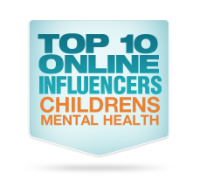 Editor’s note: I “met” Kimberlie Zakarian online after our series with Rhett Smith several years ago on The Anxious Christian. Kimberlie attended school with Rhett and leads a group for parents of kids with hidden disabilities, bipolar disorder, autism, depression, ADHD, anxiety and oppositional defiant disorder at a YMCA in the Los Angeles area.
Editor’s note: I “met” Kimberlie Zakarian online after our series with Rhett Smith several years ago on The Anxious Christian. Kimberlie attended school with Rhett and leads a group for parents of kids with hidden disabilities, bipolar disorder, autism, depression, ADHD, anxiety and oppositional defiant disorder at a YMCA in the Los Angeles area.
Kimberlie had asked me if our readers would be interested in “real-life” perspectives from families in the church impacted by mental illness. Here’s her family’s story…
When a new mother is pregnant she prays for her baby to be healthy. I believe all moms worry to some degree about this issue. I also think the focus is often on physical health. I personally never once thought to pray for my daughter’s mental health.
When “Kaylie” was born she was healthy, and well, perfect. The doctor shouted, “Nine on the Apgar! It doesn’t get better than that!” She looked like a wise soul from the start. As she grew, three things stood out to me: her intellect, her activity level, and her humor.
I would be exhausted every day caring for this child who never stopped. She could do and remember things beyond what was developmentally normal, and had a sense of humor and language skills that teachers and physicians found remarkable. People often commented on how busy she was. They would say things along the lines of: She is not bad, she just never stops. She is so smart! I have never seen a child this busy, not even a boy! She knew her colors and could count to seventeen by 18 months. She also sat and prayed a long prayer to God at the age of 21 months when I was pregnant with my second child and showing signs of fatigue in the kitchen.
Her insight amazed me. But I was worn out. I felt an innate instinct to protect her and keep her hand within mine in public. She was impulsive and would dash off to activities if she could get away with it. But something else seemed wrong.
At 12 months our pediatrician was curious about her eyesight. I had noticed that she would close her eyes tightly when outdoors in the sun and had what seemed to be depth perception issues. She received a diagnosis of Ocular Albinism by 18 months. Ocular Albinism is a condition of decreased pigmentation of the iris and retina, which is the light-sensitive tissue at the back of the eye. Pigmentation in the eye is necessary for normal vision. This condition cannot be corrected with glasses and sunlight and glares are painful.
Kaylie’s diagnosis resulted in visits to City of Hope, Children’s Hospital, and the National Institutes of Health (NIH). Geneticists, pulmonologists, hematologists, nephrologists and eventually, a retinologist led me to learn about Hermansky Pudlak Syndrome (HPS), a potentially life threatening disease which consists of prolonged bleeding time, pulmonary fibrosis, and kidney failure. Conferring with the doctors on the East Coast and getting blood work under a special microscope confirmed that my daughter had a disease that could potentially kill her later in life.
There are nine types of HPS, three have milder symptoms. I spent a decade learning from the doctor’s at NIH and educating the hematologists here in Los Angeles. There were only about 200 known cases in the world at the time and none known on the West Coast. Most individuals with HPS have Albinism (little or no production of the pigment melanin. The type and amount of melanin your body produces determines the color of your skin, hair and eyes) Kaylie was not Albino, but I had no idea if that meant anything. What I didn’t know is that this “hidden” disability, which included what looked like behavioral issues because her’ vision was not correctable with glasses, was to be the least of my worries. The real danger to her life and our family was pediatric bipolar disorder which had not yet completely reared its head.
So I had a little girl who was very active who could not see unless she was up close to something. This led to not staying in her seat, impulsivity, behavioral issues, and constant chatter and questions. She was a delight in so many ways, but it would be dishonest if I said it was not draining.
 It affected every area of our lives, including our church life and ministry. One evening, while I was doing a baptism at church, Kaylie darted away from a family member in the front pew and rushed up the steps to the baptismal so she could see mommy baptizing people. She had such a love for God and hunger to learn that she did what was natural for her. I understood it. But I also knew it may have been disruptive to others. I will never forget my pain, and inner anger, at our next staff meeting when our new pastor brought up the topic of parents not controlling their children and how these kids think they are the center of the universe.
It affected every area of our lives, including our church life and ministry. One evening, while I was doing a baptism at church, Kaylie darted away from a family member in the front pew and rushed up the steps to the baptismal so she could see mommy baptizing people. She had such a love for God and hunger to learn that she did what was natural for her. I understood it. But I also knew it may have been disruptive to others. I will never forget my pain, and inner anger, at our next staff meeting when our new pastor brought up the topic of parents not controlling their children and how these kids think they are the center of the universe.
Once Kaylie’s bipolar disorder was diagnosed at age ten and I finished my Masters of Science in Marriage and Family Therapy (MSMFT), I knew educating church leaders on disabilities and mental illness was going to be one of my passions.
I walked through seven years of horror wondering which type of HPS my daughter had. We traveled to NIH to have a special procedure done to diagnose the type. It took months to get the results. Eight months later received a phone call that Kaylie had Type Three HPS, the type with the mildest symptoms. I was so relieved, but that did not take away from what had begun to emerge ten month earlier in Kaylie’s life: signs of rage and debilitating depression.
The first inkling that something was amiss emotionally was when Kaylie showed signs of rage. She was frustrated one afternoon and grabbed her grandmother who she adores, screamed, then threw and broke a vase. After a few of these episodes, I took her to a well known pediatrician in our area that specialized in Attention Deficit Disorder, anxiety, and depression. He assessed her and determined that a diagnosis of pediatric bipolar disorder was a possibility. He referred us to a pediatric psychiatrist who confirmed the diagnosis. After the doctor shared his story of having a son with bipolar disorder as a child and how medication had changed his life, I made the difficult decision to start Kaylie on mood stabilizers and a low dose antidepressant. She also began therapy. Over time, I had three more psychiatrists assess her to be sure. They all confirmed a diagnosis of bipolar disorder.
We had ups and downs for over a year; lots of fits and seasons of depression. Her depression made it difficult to get to school and church. Her mania caused many moments of embarrassment as I learned to handle her better in moments of mood swings. Kaylie also experienced intense anxiety. One evening, at the age of fifteen, she was having a panic attack and stepped outside the sanctuary to get air which she was allowed to do. She started to walk and didn’t see the change in the depth of the patio and tripped and fell down the stairs. Because of her embarrassment, she walked a little way down the sidewalk where she experienced a panic attack. A police car drove by and mistook her symptoms for the influence of some kind of substance. They took her to the hospital, which only increased her panic.
When I exited my own church service I could not find my daughter. The church was ill equipped to help. I finally located her in the hospital where the police had taken her – all for a panic attack. Another time she was feeling irritable at church and I allowed her to walk within eyesight to regroup. A congregant tried to talk to her and in the state she was in she could not answer. They began chastising her for being a rude teen.
My daughter and our family suffered so many of these types of incidents which led to low self esteem, depression, cutting, and emergency room visits because of her bleeding disorder. Some of her hospitalizations were for several days. During those times, not one person from the church we were at came to visit or pray with me. My guess is that they perhaps did not know how to handle mental illness. Walking those early years alone as a parent of a child with bipolarity led to depression and trauma on my part. This is the trauma many parents of children with hidden disabilities endure. We suffer from lack of support and understanding, exhaustion, embarrassment, stigma, feeling unimportant, and being overlooked. This emotional trauma as a parent took my own personal therapy to get over. This is why it is now my life’s work to help other parents, community leaders, first responders, and church leaders to understand mental illness.
It has been a long road, but Kaylie is now properly medicated and she has had years of therapy and psychoeducation. Improvements came when we added an antipsychotic medication called Seroquel. Medication completely changed-and possibly saved my daughter’s life – and the family dynamics. She was stable, happy, and her depression diminished. People in our church community made comments about medication and lack of faith. These words and the lack of knowledge behind them hurt so many families. There are certain disorders that need medication, much as a broken leg needs a cast to heel. God “can” heal that leg through prayer and faith, but most often God expects us to go to a doctor and get a cast. The same is true with certain hidden disabilities. God has the power to heal them, but He usually directs us to doctors and other professionals to get the help and quality of life that is possible.
Today Kaylie is an amazing young woman. She is a strong, vibrant, intelligent, and wants to be a psychotherapist who works with children and troubled teens. She runs 10 miles a day, draws at a professional level, sings and plays guitar, and is getting ready to study psychology in college.
Medication and therapy changed her life. Children cannot treat themselves. They rely on the adults in their life to get them help – or not. For us, I am thankful that we used the resources that were available. They saved my daughter and our family.
Note: Pediatric Bipolar Disorder is the presence of extreme emotional states that occur in distinct periods called “mood episodes.” These distinct periods of elevated, expansive or irritable mood are accompanied by intense shifts in activity, energy, behavior, and sleep. These episodes are distinct changes from a person’s normal mood and behaviors. When a child or adolescent is extremely silly, talkative, joyful, or excited this can be a manic episode. Intense sadness, fatigue and hopelessness are frequently associated with depressive episodes. In children, moods can include symptoms of irritability and rage. Bipolar Disorder affects millions of Americans. The National Institute of Mental Health (NIMH) estimates that more than one-half of all cases are diagnosed between the ages of 15 to 25.
About the author:
 The Rev. Kimberlie Zakarian is Licensed Marriage and Family Therapist in private practice in Glendale, California as well as the director of Thrive Therapy Center, a non-profit organization. She is a graduate of Fuller Seminary School of Psychology with a Masters of Science in Marriage and Family Therapy (MSMFT). She has post doctorate training from Harvard Medical School in ADHD, mood disorders, and psychopharmacology and holds certificates from Duke University in Religious Cognitive Behavioral Therapy and Cognitive Behavioral Therapy. Kimberlie specializes in mood disorders, ADHD, and trauma. She is currently completing her Psy.D. in Marriage and Family Therapy. She is an ordained minister, columnist, and speaker and regularly does trainings for parents, churches, schools, and first responders on how to effectively work with special needs children and mental illness. She can be reached at Kimberlie@kimberliezakariantherapy.com
The Rev. Kimberlie Zakarian is Licensed Marriage and Family Therapist in private practice in Glendale, California as well as the director of Thrive Therapy Center, a non-profit organization. She is a graduate of Fuller Seminary School of Psychology with a Masters of Science in Marriage and Family Therapy (MSMFT). She has post doctorate training from Harvard Medical School in ADHD, mood disorders, and psychopharmacology and holds certificates from Duke University in Religious Cognitive Behavioral Therapy and Cognitive Behavioral Therapy. Kimberlie specializes in mood disorders, ADHD, and trauma. She is currently completing her Psy.D. in Marriage and Family Therapy. She is an ordained minister, columnist, and speaker and regularly does trainings for parents, churches, schools, and first responders on how to effectively work with special needs children and mental illness. She can be reached at Kimberlie@kimberliezakariantherapy.com
***********************************************************************************************************
 Key Ministry has assembled resources to help churches more effectively minister to children and adults with ADHD, anxiety disorders, Asperger’s Disorder, Bipolar Disorder, depression and trauma. Please share our resources with any pastors, church staff, volunteers or families looking to learn more about the influence these conditions can exert upon spiritual development in kids, and what churches can do to help!
Key Ministry has assembled resources to help churches more effectively minister to children and adults with ADHD, anxiety disorders, Asperger’s Disorder, Bipolar Disorder, depression and trauma. Please share our resources with any pastors, church staff, volunteers or families looking to learn more about the influence these conditions can exert upon spiritual development in kids, and what churches can do to help!





I am blown away by your website. I did not discover you until close to completing my own manuscript written to be a resource and encouragement for Christian families raising children with hidden disabilities. The correlations between your articles and my writings makes me feel like kindred spirits with the intent of your own postings.
My manuscript is currently in it’s last edit on its way to the final proofer. The title of my work is called, “Toppling the Idol of Ideal: Raising Children with Hidden Disabilities”. If you are interested, I can send you a PDF of my manuscript, with permission to print excepts as articles.
Blessings, Melanie Boudreau
Sent from my iPhone
>
LikeLike
Hi Melanie,
Awesome! The movement to help churches include more families impacted by disability can certainly use another voice!
Feel free to send anything you’d like to share along to steve@keyministry.org.
LikeLike
This was an EXCELLENT story and so in touch with what is happening in the church. I could identify on so many levels with my own daughter. I will definitely be contacting her with some questions I would like to ask regarding research I am doing for a book I am writing. Thank you again.
LikeLike
Thank you for sharing. May the Lord use you to awaken the church.
LikeLike
Greetings,
I attempted to contact the author of the post below using the email provided in the bio, and the auto responder set up at that account is two years out of date. Do you have a better contact email you can provide on this author? Thank you.
Melanie
LikeLike
Melanie,
I passed the e-mail associated with your account to Kimberlie and asked her if she could follow up with you.
LikeLike